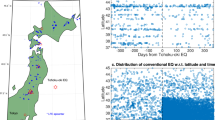Abstract
EVERY few years we pass through a season of marked earthquake-frequency, or, as Mallet called it, a ‘period of paroxysmal energy’. In the mere fact of clustering, there is nothing remark-able; it is its intensity, rather than its existence, that is worthy of notice. In Italy, for example, Mercalli pointed out, 209 destructive earth-quakes occurred between the years 1601 and 1881, and 182 of them in 103 years. In other words, the average frequency of great earthquakes during one of the cluster-years was eleven times that during one of the remaining years.
This is a preview of subscription content, access via your institution
Access options
Subscribe to this journal
Receive 51 print issues and online access
$199.00 per year
only $3.90 per issue
Buy this article
- Purchase on Springer Link
- Instant access to full article PDF
Prices may be subject to local taxes which are calculated during checkout
Similar content being viewed by others
References
G. Mercalli, "Vulcani e fenomeni vulcanici in Italia," 1888, pp 353–355.
Brit. Ass. Rep., 1858, p. 49 and plates 1–6.
Brit. Ass. Rep., 1908, pp. 63–64; 1909, pp. 56–58.
Brit. Ass. Rep., 1911, pp. 649-440.
The date of the maximum epoch M may be too early, for, towards the end of the century, the catalogue may not be quite complete.
Rights and permissions
About this article
Cite this article
DAVISON, C. Clustering and Periodicity of Earthquakes. Nature 120, 587–588 (1927). https://doi.org/10.1038/120587a0
Issue Date:
DOI: https://doi.org/10.1038/120587a0
Comments
By submitting a comment you agree to abide by our Terms and Community Guidelines. If you find something abusive or that does not comply with our terms or guidelines please flag it as inappropriate.



